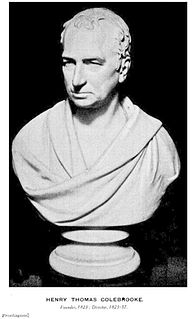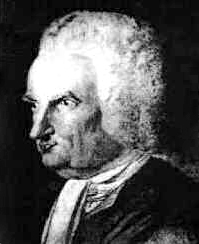
Henry Thomas Colebrooke FRS FRSE was an English orientalist and mathematician. He has been described as "the first great Sanskrit scholar in Europe".

The word Puranas literally means "ancient, old", and it is a vast genre of Indian literature about a wide range of topics, particularly myths, legends and other traditional lore. Composed primarily in Sanskrit, but also in regional languages, several of these texts are named after major Hindu deities such as Vishnu, Shiva and Devi. The Puranas genre of literature is found in both Hinduism and Jainism.

Nathaniel Brassey Halhed was an English Orientalist and philologist.

James Burnett, Lord Monboddo, was a Scottish judge, scholar of linguistic evolution, philosopher and deist. He is most famous today as a founder of modern comparative historical linguistics. In 1767 he became a judge in the Court of Session.
Bimal Krishna Matilal (1935–1991) was an Indian philosopher whose influential writings present the Indian philosophical tradition as a comprehensive system of logic incorporating most issues addressed by themes in Western philosophy. From 1977 to 1991 he was the Spalding Professor of Eastern Religion and Ethics at the University of Oxford.

The Brahma Purana is one of the eighteen major Puranas genre of Hindu texts in Sanskrit language. It is listed as the first Maha-Purana in all the anthologies, and therefore also called Adi Purana. Another title for this text is Saura Purana, because it includes many chapters related to Surya or the Sun god. The name Brahma Purana is misleading and apocryphal because the extant manuscripts of this text have nothing to do with the Hindu god Brahma, and are actually just a compilation of geographical Mahatmya and sections on diverse topics.

The Agni Purana, is a Sanskrit text and one of the eighteen major Puranas of Hinduism. The text is variously classified as a Purana related to Shaivism, Vaishnavism, Shaktism and Smartism, but also considered as a text that covers them all impartially without leaning towards a particular theology.
The Vamana Purana, is a medieval era Sanskrit text and one of the eighteen major Puranas of Hinduism. The text is named after one of the incarnations of Vishnu and probably was a Vaishnava text in its origin. However, the modern surviving manuscripts of Vamana Purana are more strongly centered on Shiva, while containing chapters that revere VIshnu and other Hindu gods and goddesses. It is considered a Shaiva text. Further, the text hardly has the character of a Purana, and is predominantly a collection of Mahatmyas to many Shiva-related places in India with legends and mythology woven in.
The Markandeya Purana is a Sanskrit text of Hinduism, and one of the eighteen major Puranas. The text's title Markandeya refers to a sage in Hindu mythology, who is the central character in two legends, one linked to Shiva and other to Vishnu. The Markandeya text is one of the Puranas that lacks a sectarian presentation of ideas in favor of any particular god, and it is rare to read any deity being invoked or deity prayers in the entire text.

The Brahmanda Purana (r.c.9.hulk) is a Sanskrit text and one of the eighteen major Puranas, a genre of Hindu texts. It is listed as the eighteenth Maha-Purana in almost all the anthologies. The text is also referred in medieval Indian literature as the Vayaviya Purana or Vayaviya Brahmanda, and it may have been same as the Vayu Purana before these texts developed into two overlapping compositions.

The Yuga Purana is a Sanskrit text and the last chapter of a Jyotisha (astrology) text Vriddhagargiya Samhita. It is also considered a minor text in the Puranic literature.
George Cardona is an American linguist, Indologist, Sanskritist, and scholar of Pāṇini. Described as "a luminary" in Indo-European, Indo-Aryan, and Pāṇinian linguistics since the early sixties, Cardona has been recognized as the leading Western scholar of the Indian grammatical tradition (vyākaraṇa) and of the great Indian grammarian Pāṇini. He is currently Professor Emeritus of Linguistics and South Asian Studies at the University of Pennsylvania. Cardona was credited by Mohammad Hamid Ansari, the vice president of India, for making the University of Pennsylvania a "center of Sanskrit learning in North America", along with Professors W. Norman Brown, Ludo Rocher, Ernest Bender, Wilhelm Halbfass, and several other Sanskritists.

Castellví de Rosanes is a municipality in the comarca of the Baix Llobregat in the province of Barcelona, Catalonia, Spain. As of 2016, the municipality had 1,807 inhabitants and was 16.4 km2, which includes the neighbourhoods of Els Àngels, Can Sunyer del Palau, Miralles, El Taió and Valldaina.
Varadarāja was a 17th-century Sanskrit grammarian. He compiled an abridgement of the work of his master, the Siddhānta Kaumudī of Bhaṭṭoji Dīkṣita, in three versions, referred to as madhya "middle", laghu "short" and sāra "substance, quintessence" versions of the Siddhāntakaumudī, the latter reducing the number of rules to 723. These are comparatively accessible introductions to the very technical grammar of Pāṇini himself, and the 1849 edition by Ballantyne was important to the understanding of native Indian grammatical tradition in Western scholarship.
William Norman Brown was a distinguished Indologist and Sanskritist who established the first academic department of South Asian Studies in North America and organized the American Oriental Society in 1926. He was the Professor of Sanskrit at the University of Pennsylvania for most of his academic career. He was president of the Association for Asian Studies in 1960. He is considered the founder of the field of South Asian Studies, which he pioneered in his career over four decades at the University of Pennsylvania, where he helped to found the Department of Oriental Studies (1931), and later single-handedly founded the Department of South Asia Regional Studies (1948). These departments are now survived by the departments of East Asian Languages and Civilizations, Near Eastern Languages and Civilizations, and South Asia Studies. W. Norman Brown also founded the American Institute of Indian Studies, which was located in the Van Pelt Library at the University of Pennsylvania.

The Matsya Purana is one of the eighteen major Puranas (Mahapurana), and among the oldest and better preserved in the Puranic genre of Sanskrit literature in Hinduism. The text is a Vaishnavism text named after the half-human and half-fish avatar of Vishnu. However, the text has been called by the 19th-century Sanskrit scholar Horace Hayman Wilson, "although a Shaivism (Shiva-related) work, it is not exclusively so"; the text has also been referred to one that simultaneously praises various Hindu gods and goddesses.
Alexander Hamilton (1762-1824) was a British linguist who was one of the first Europeans to study the Sanskrit language. He taught the language to most of the earliest European scholars of Indo-European linguistics. He became the first professor of Sanskrit in Europe.
Ludo Rocher (1926-2016) was an eminent Sanskrit scholar, and the W. Norman Brown Professor Emeritus of South Asia Studies at the University of Pennsylvania.
Rosane Rocher is a leading historian of Indology and a Professor Emerita of South Asia Studies at the University of Pennsylvania.













